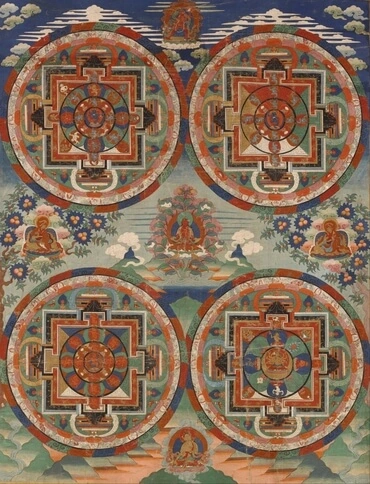1
Und Joseph kam und berichtete dem Pharao und sprach: Mein Vater und meine Brüder und ihr Kleinvieh und ihre
inder und alles, was sie haben, sind aus dem Lande Kanaan gekommen; und siehe, sie sind im Lande Gosen.
2
Und er nahm aus der Gesamtheit seiner Brüder fünf Männer und stellte sie vor den Pharao.
3
Und der Pharao sprach zu seinen Brüdern: Was ist eure Hantierung? Und sie sprachen zum Pharao: Deine Knechte sind Schafhirten, sowohl wir als auch unsere Väter.
4
Und sie sprachen zum Pharao: Wir sind gekommen, um uns im Lande aufzuhalten; denn es gibt keine Weide für das Kleinvieh, das deine Knechte haben, denn die Hungersnot ist schwer im Lande Kanaan; und nun laß doch deine Knechte im Lande Gosen wohnen.
5
Da sprach der Pharao zu Joseph und sagte: Dein Vater und deine Brüder sind zu dir gekommen.
6
Das Land Ägypten ist vor dir: laß deinen Vater und deine Brüder in dem besten Teile des Landes wohnen; sie mögen wohnen im Lande Gosen. Und wenn du weißt, daß tüchtige Männer unter ihnen sind, so setze sie als Aufseher über das Vieh, das ich habe.
7
Und Joseph brachte seinen Vater Jakob und stellte ihn vor den Pharao. Und Jakob segnete den Pharao.
8
Und der Pharao sprach zu Jakob: Wie viel sind der Tage deiner Lebensjahre?
9
Und Jakob sprach zum Pharao: Die Tage der Jahre meiner Fremdlingschaft sind 130 Jahre; wenig und böse waren die Tage meiner Lebensjahre, und sie haben nicht erreicht die Tage der Lebensjahre meiner Väter in den Tagen ihrer Fremdlingschaft.
10
Und Jakob segnete den Pharao und ging von dem Pharao hinaus.
11
Und Joseph schaffte seinem Vater und seinen Brüdern Wohnung und gab ihnen ein Besitztum in dem Lande Ägypten, im besten Teile des Landes, im Lande
aemses, so wie der Pharao geboten hatte.
12
Und Joseph versorgte seinen Vater und seine Brüder und das ganze Haus seines Vaters mit Brot, nach der Zahl der Kinder.
13
Und es war kein Brot im ganzen Lande, denn die Hungersnot war sehr schwer; und das Land Ägypten und das Land Kanaan verschmachteten vor Hunger.
14
Und Joseph brachte alles Geld zusammen, das sich im Lande Ägypten und im Lande Kanaan vorfand, für das Getreide, das man kaufte; und Joseph brachte das Geld in das Haus des Pharao.
15
Und als das Geld im Lande Ägypten und im Lande Kanaan ausging, da kamen alle Ägypter zu Joseph und sprachen: Gib uns Brot! warum sollen wir denn vor dir sterben? denn das Geld ist zu Ende.
16
Und Joseph sprach: Gebet euer Vieh her, und ich will euch Brot geben um euer Vieh, wenn das Geld zu Ende ist.
17
Da brachten sie ihr Vieh zu Joseph, und Joseph gab ihnen Brot um die Pferde und um das Kleinvieh und um das
indvieh und um die Esel; und so ernährte er sie mit Brot um all ihr Vieh in selbigem Jahre.
18
Als selbiges Jahr zu Ende war, da kamen sie im zweiten Jahre zu ihm und sprachen zu ihm: Wir wollen es meinem Herrn nicht verhehlen, daß, da das Geld ausgegangen ist und der Besitz des Viehes (O. der Viehbestand, die Viehherden) an meinen Herrn gekommen, nichts mehr übrigbleibt vor meinem Herrn als nur unser Leib und unser Land.
19
Warum sollen wir vor deinen Augen sterben, sowohl wir als auch unser Land? Kaufe uns und unser Land um Brot, so wollen wir und unser Land des Pharao Knechte sein; und gib Samen, daß wir leben und nicht sterben und das Land nicht wüste werde!
20
Und Joseph kaufte das ganze Land Ägypten für den Pharao; denn die Ägypter verkauften ein jeder sein Feld, weil der Hunger sie drängte. Und so ward das Land dem Pharao.
21
Und das Volk, das versetzte er in die verschiedenen Städte, (W. je nach den Städten) von einem Ende der Grenze Ägyptens bis zu ihrem anderen Ende.
22
Nur das Land der Priester kaufte er nicht; denn die Priester hatten ein Bestimmtes von dem Pharao, und sie aßen ihr Bestimmtes, das der Pharao ihnen gab; deshalb verkauften sie ihr Land nicht.
23
Und Joseph sprach zu dem Volke: Siehe, ich habe euch und euer Land heute für den Pharao gekauft; siehe, da ist Samen für euch, und besäet das Land.
24
Und es soll geschehen mit dem Ertrage, daß ihr den Fünften dem Pharao gebet, und die vier Teile sollen für euch sein zur Saat des Feldes und zur Speise für euch und für die, welche in euren Häusern sind, und zur Speise für eure Kinder.
25
Und sie sprachen: Du hast uns am Leben erhalten; möchten wir Gnade finden in den Augen meines Herrn, so wollen wir des Pharao Knechte sein.
26
Und Joseph legte es dem Lande Ägypten bis auf diesen Tag als Satzung auf, daß dem Pharao der Fünfte gehöre. Nur das Land der Priester allein ward nicht dem Pharao.
27
Und Israel wohnte im Lande Ägypten, im Lande Gosen; und sie machten sich darin ansässig und waren fruchtbar und mehrten sich sehr.
28
Und Jakob lebte im Lande Ägypten siebzehn Jahre; und der Tage Jakobs, der Jahre seines Lebens, waren 147 Jahre.
29
Und als die Tage Israels herannahten, daß er sterben sollte, da rief er seinen Sohn Joseph und sprach zu ihm: Wenn ich doch Gnade gefunden habe in deinen Augen, so lege doch deine Hand unter meine Hüfte (O. Lende) und erweise Güte und Treue an mir: begrabe mich doch nicht in Ägypten!
30
Wenn ich mit meinen Vätern liegen werde, so führe mich aus Ägypten und begrabe mich in ihrem Begräbnis. Und er sprach: Ich werde tun nach deinem Worte.
31
Da sprach er: Schwöre mir! Und er schwur ihm. Und Israel betete an zu den Häupten des Bettes. (Nach anderer Vokalisation: über seinem Stabe)







